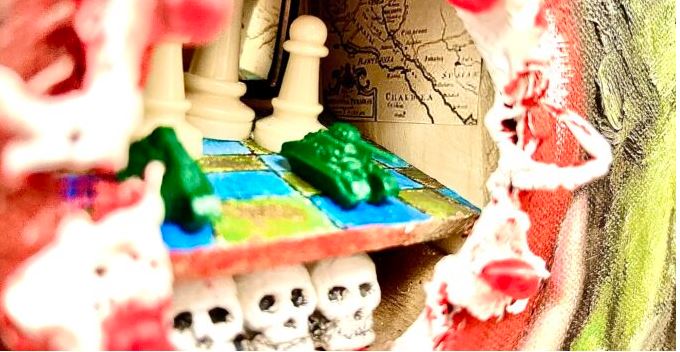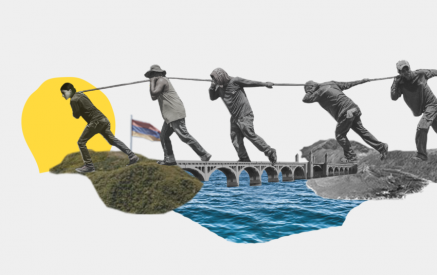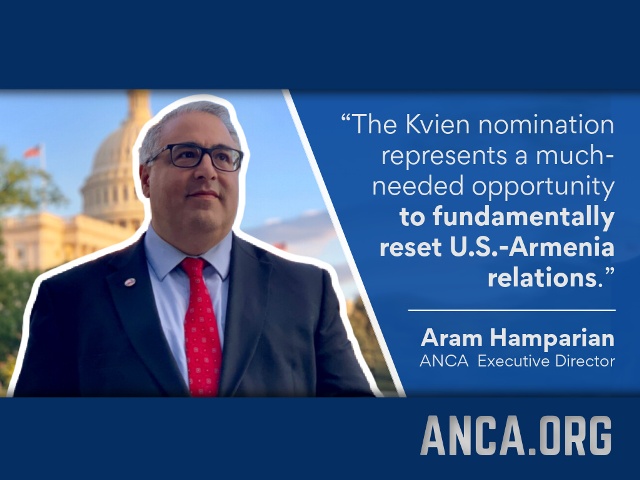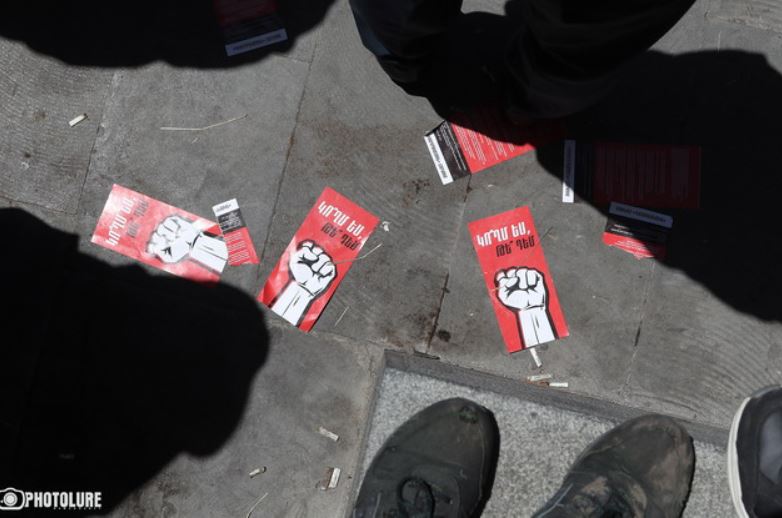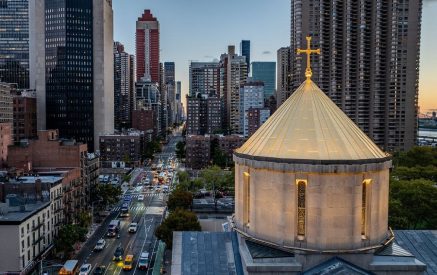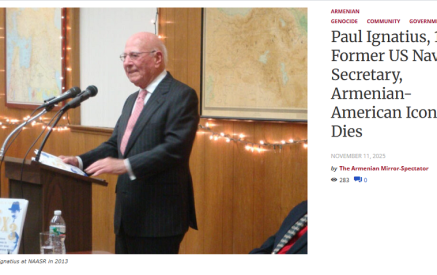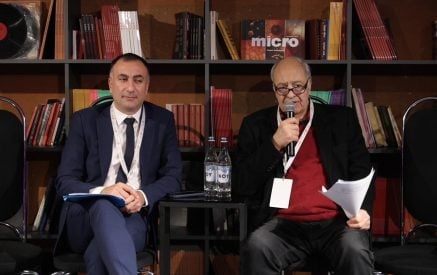The Armenian Weekly
by Ruby Topalian
Most kids spend their childhoods running around playgrounds, playing dress-up and haphazardly scribbling in coloring books. But from the age of two, Shakeh Hagopian has spent hours a day with her head down, pencil in hand, sketching. When she reached elementary school, her parents became concerned by how much time Shakeh spent consumed by her art, as she devoted up to 16 hours a day to drawing, painting and creating beautiful images.
While as a child Hagopian was motivated by her love for the artistic process, masterfully drawing animals, flowers and basic landscapes, her art has gradually evolved into a force of powerful activism geared towards the Armenian cause. This month, Hagopian’s artistic activism took her to Capitol Hill, as she was awarded the prestigious Congressional Art Prize for the state of Vermont.
Hagopian’s award-winning piece “Noor of Truth,” which took three weeks to create, was the product of her frustration with the meager coverage of the blockade of Artsakh in media and government. “I’ve been protesting for years about Artsakh and trying to get it publicized. But this is the one chance that I had to actually speak to politicians through the use of imagery,” Hagopian said. “I decided this was going to be about Artsakh, about Armenia, because no matter how many times I protest outside of the Capitol, I won’t get their attention unless they see it face to face, and they have to talk to me and, you know, they have no other choice,” she stressed.
Read also
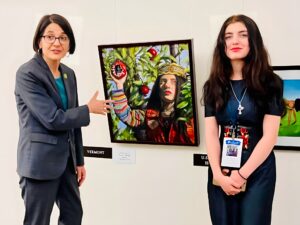
Hagopian poses for a photo with her painting and Congresswoman Becca Balint (D-VT). As part of her day on Capitol Hill, Hagopian also had the opportunity to engage in a sit-down meeting with Balint where she not only discussed “Noor of Truth” but also advocated for Balint’s increased involvement in Armenian issues.
At just fifteen years old, Hagopian is still in high school, which means all of her time outside of school for those weeks was spent painting. “I’d be painting until 10 p.m., not doing any homework. Nothing. And my grades got so bad. But I was like, ‘Hey, this is worth it,’” she said. To make matters more difficult, Hagopian does not work out of an official art studio. “I don’t really have a studio, so it was very chaotic. It was my bedroom. There’s this giant easel and all my paints and I was inhaling toxic oil paint when I went to sleep. I was that determined […] from time to time I had to paint inside my dad’s workplace […] I had to paint outside in freezing weather,” she shared.
Despite these setbacks, Hagopian persevered. Inspired by both her sister, Kala Hagopian —who won the Congressional Art Prize for her painting “The Last Armenian” in 2002—and her father, Philip Hagopian, a well-known professional painter in Armenia, she poured herself into her work and produced something marvelous. The principal figure in the piece is a depiction of herself, but the primary importance of the work lies inside the pomegranate, or “noor.”
“I wanted a visually pleasing sort of face for the painting so that the viewer’s eyes would be drawn to the painting, but then there’s that hidden element in the corner inside the pomegranate that also just jumps out […] When you look inside the pomegranate, there is a chessboard in the colors of the earth propped up by three skulls that I sculpted myself. And the chessboard […] there’s a reason why it’s in the colors of the earth. It’s got pawns on it, tanks. And it’s supposed to represent a kind of global chessboard, that this is all just sort of a game, all of this politics, all of these wars; it’s all just a game motivated by money, which is why I put a dollar bill in the background,” Hagopian explained. “And there is a mirror inside of the pomegranate. And when you look inside the pomegranate, you’re also seeing yourself in front of the chessboard and the skulls representing Armenian skulls. And suddenly, it goes back to you.”
All of these details packed inside of one small pomegranate are ultimately meant to serve as a call to action. “It’s supposed to spread this message [that it] all starts with you, like your tax money is funding Azerbaijan. And it’s up to you to stop that. And there are images in the corners that are very hidden of a soldier with a bunch of tombstones behind him, a little boy looking at a tank and a map of ancient historical Armenia and how huge it once was. And I put those in there just to really get the message straight,” Hagopian said.
Hagopian’s success has brought a great victory to Vermont, which thrilled the Armenian National Committee (ANC) of Vermont. “The ANC of Vermont is extremely proud of Shakeh. Shakeh’s rare piece of artwork is complex, graceful and hypnotically tantalizing at first glance of the eye, then successfully entices the viewer to understand the passion, pain and resilience that burns in the heart of the artist and in the hearts of all Armenians,” ANC of VT chairperson Pearl A. Bargamian Teague said.
Hagopian’s awe-inspiring piece was so profound that it earned recognition from New York Times best-selling author Chris Bohjalian. He retweeted an image of “Noor of Truth” and captioned the post saying, “Very proud today (all days) to be a Vermonter and an Armenian-American.”
Hagopian’s school art teacher Colleen Flanagan couldn’t be more proud. “Shakeh is a driven and talented artist whose work is not only stunningly executed but is also full of intention. Every aspect of ‘Noor of Truth’ holds meaning to Armenian culture. Shakeh used symbolism as a way to portray these connections that can be seen in the imagery, the colors chosen and in the way the figure, a self-portrait, is positioned […] It is Shakeh’s innate abilities to combine the two aspects of visual art that make visual art outstanding: powerful aesthetics and big ideas that evoke emotion,” Flanagan said.
Though Hagopian’s art alone demonstrates her dedication to the Armenian cause, she feels that it is not enough and has turned to legislative action, specifically in the realm of education, to ensure that all of her peers understand the atrocities committed against the Armenian people. After discovering at the beginning of this year that her school had no curriculum about the Armenian Genocide and Artsakh, she took matters into her own hands and convinced her world history teacher to allow her to present to her peers.
“I taught the entire sophomore grade history class about the Armenian Genocide and about Artsakh, about 2020, 2022 […] I made this giant Google slideshow presentation about it all. […] I said, ‘Hey, when you get home, go on anca.org’ […] give it as much attention as you guys did with Ukraine,” Hagopian said.
Hagopian’s efforts generated a passionate response from her peers, and students from all over the school came to watch her speak. “Shakeh is really exceptional in her poise, courage and conviction as an advocate for her people. Shakeh’s peers look up to her and she gracefully commands the respect of young people and adults alike.[…] As word got out about how impactful her presentation was, other teachers and students came to my class to sit-in […],” her world history teacher Perry Bellow-Handelman said.
But Hagopian’s teaching efforts did not stop at her school. During the spring, she also delivered her presentation at the Vermont Principals Association, where all Vermont superintendents were present. Moving forward, Bellow-Handelman is hoping to support Hagopian’s mission to increase Armenian Genocide education in Vermont by searching for additional venues where she can speak and will continue to have Hagopian present to her students next year.
Looking to the future, Hagopian wants nothing more than to return to Armenia, where she hopes to attend the American University of Armenia. Though she is uncertain if she will pursue art professionally, she knows that her career will be dedicated to defending Armenia. “I see lots of Armenians idolizing Garegin Nzhdeh and Monte Melkonian, and I always think if we all took on that role ourselves, we could really get Armenia out of this situation, and we have to take that onto ourselves. Each one of us is responsible for the whole world’s condition,” Hagopian said.
In the artist’s words:
Noor of Truth
Oils, Mixed Media
By Shakeh Hagopian
Congressional Art Competition
Winner from Vermont – 2023
Montpelier High School
The purpose of my painting was to bring Armenia-Artsakh’s crisis to both the viewers and the US government’s attention.
I utilized my painting to serve as a reminder to those who pass by my painting in the US Capitol that they are complicit in funding the ethnic cleansing of indigenous Armenians by sending military aid to Azerbaijan.
I accomplished this by subtly implementing images that showcased the tragic fate of Armenia inside a small crevice in the canvas. The viewers would be drawn to the lush 3D pomegranate springing out to speak to the viewer. Inside the pomegranate, I put a chess board in the colors of pawns and military tanks to represent that the crisis Armenia and Artsakh are facing is somewhat of a proxy war. As a result of this proxy war, you can see a pile of skulls I sculpted myself to support the chess board, to show that this geopolitical oil monopoly is at the expense of Armenian lives.
I glued dollar bills to really get my message through that most of this is motivated by greed and the oil business. I also added a small printed map of ancient Armenia and powerful yet tragic images of the Artsakh war’s aftermath.
I tied these elements all together with a mirror inside to interact with the viewer, spreading the important message that this can all be prevented if YOU subverted the government’s rapacity in gaining oil wealth out of what is an existential threat to Armenia.
Many may find my painting visually pleasing, but I did not paint this to win or to have a beautiful piece of art to decorate a wall. I painted this to get an important message across – and it’s up to the average citizen to help accomplish this. Your tax money funds Azerbaijan and Turkey’s military, and it’s contributing to the ethnic cleansing of indigenous Armenians.




















































